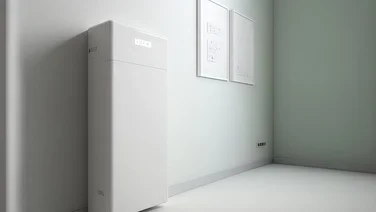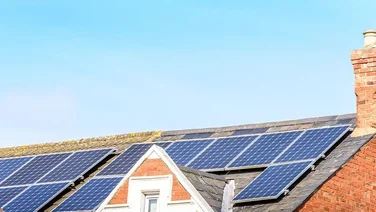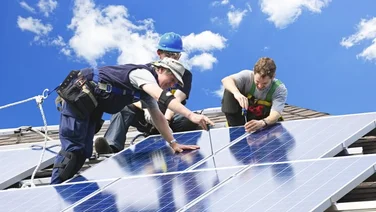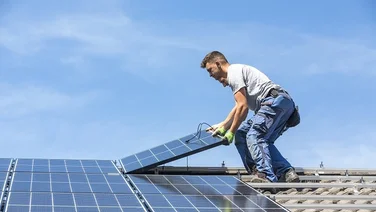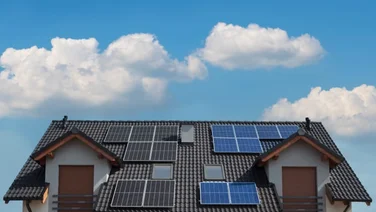We receive a small fee from trusted installers when you request a quote through our site. This helps us keep our content independent, well-researched and up to date – Learn more
✔ You need Listed Building Consent to put solar panels on a listed building
✔ Once you have Listed Building Consent, apply for planning permission
✔ Switching to solar? Fill in the form above for free solar panel quotes
By paying solar panel prices, you’ll benefit from lower energy bills, and significantly reduce your household’s carbon footprint. But before you get started, there’s one thing you’ll need to check – do you need planning permission?
This guide will give you the lowdown on which homes in the UK need to contact their council before placing panels on their roof. Once you’ve sussed out your situation, you’re ready to start saving with solar – but knowing exactly where to start can be tricky.
This is where we come in. To receive solar panel quotes from our trusted suppliers, all you have to do is tell us a bit about your home, and our team of experts will help you find the perfect set of panels.
Where do you want to install solar panels?
Get started
What’s on this page?
01 | Do I need planning permission for solar panels?
02 | How to apply for planning permission
03 | What else do I need to consider?
04 | Rules for fitting solar PV onto your roof
05 | Planning permission for solar panels: What next?
Do I need planning permission for solar panels?
However intimidating it may sound, requesting planning permission for solar panels is actually very simple. Unless you live in either a listed building or a conservation area, you wouldn’t normally need planning permission at all. This often makes the cost of solar panel installation cheaper than some other home improvements.
What if I live in a listed building?
The UK is awash with historical beauty, and although this means our streets are often overflowing with alluring architecture, it also means some houses need planning permission before they can install solar panels.
Listed buildings essentially celebrate a house’s historical architecture. If your home is a listed building, it means that it needs to be part of a planning system to protect its historical characteristics.
If you manage to get ‘listed building consent’ to install solar panels, you’ll still need to get planning permission on top of this. Think of it as an extra layer of protection for your unique home. Consent is usually dependent on the placement of your panels, and the current condition of the listed building.
How do I find out if my property is a listed building?
Visit the National Heritage List for England (NHLE) website. Here, you can find a record of all the listed buildings in England.
Living in a conservation area
Similar to a listed building, a conservation area protects culturally significant architecture in the UK.
Being in a conservation area will not necessarily stop you from fulfilling your solar-powered dreams. All you need to do is contact your local council to ensure that the changes you want to make will maintain the aesthetics of your area.
Where do you want to install solar panels?
Get startedHow to apply for planning permission
You can apply for both listed building consent and planning permission through online forms at Gov.uk. Alternatively, you can pop down to your local council offices, where they might also have the relevant forms.
When filling out your planning permission request form, you should keep an eye out for any application fees. Payments aren’t always requested, but can be depending on the circumstances. This guide to application fees will give you a helping hand.
What else do I need to consider?
Will solar panels suit the look of your home?
On very modern homes, solar panels can look sleek, clean, and consistent with the rest of the house. On older buildings, however, solar panels can stick out like a sore thumb. And though solar energy comes with a handful of benefits, local councils aren’t (yet) likely to compromise England’s notable buildings.
Will your roof support panels?
Older houses might not be as sturdy as these young whippersnapper buildings.
Having a listed building as your home can add value when you decide to sell, so to avoid any damage to the roof, it might be safer to steer clear of solar panels.
If the roof can’t support the panels, you could consider some reinforcement, subject to advice from a structural engineer. Another option could be to integrate the panels, so that they replace the existing roof covering and don’t add as much weight.
If your roof is unsuitable for solar panels, there might be other options, such as ground-mounted solar panels or wall-mounted solar panels.
Can the panels be installed appropriately?
In some cases, if panels are damaging the property, they must be removed immediately. To prevent any complications, panels must be installed in a way that ensures that they can be removed quickly and efficiently.
Rules for fitting solar panels onto your roof
- Avoid putting solar panels on the highest part of your roof – this will put more pressure on the tiles
- Solar panels should not project more than 20cm off the roof slope
- Once they are no longer being used for generating electricity, we recommend removing the panels from the roof to prevent future damage
- Use discreet solar panels to ensure that you minimise any change in the building’s appearance
If you’re looking to install solar panels on your land rather than on your house, check out the following guidelines:
- Your first standalone solar installation will be considered as ‘Permitted Development’, meaning you won’t need to seek permission from your council. Any additional units will require planning permission
- Solar panels must have minimal impact on the appearance of the area
- Panels must stand at least 5 metres from the edge of your property
- The system must not stand taller than 4 metres, and must not exceed an area of 9m²
Solar panel planning permission: next steps
Now you’ve got your head around whether or not you need planning permission, you’re ready to go solar.
And you’re not alone in this desire, with the majority of the public wanting to buy solar panels if they could, according to our latest National Home Energy Survey.
It’s time to tackle your next challenge: choosing the right solar panels for your home.
Need a helping hand? After conducting our own meticulous research, we’ve compiled a list of the best solar panels on the market, to help you choose the best option for you.
If you’re one step ahead, and are ready to begin the installation process, you can fill in this short form to receive quotes from our local installers.



